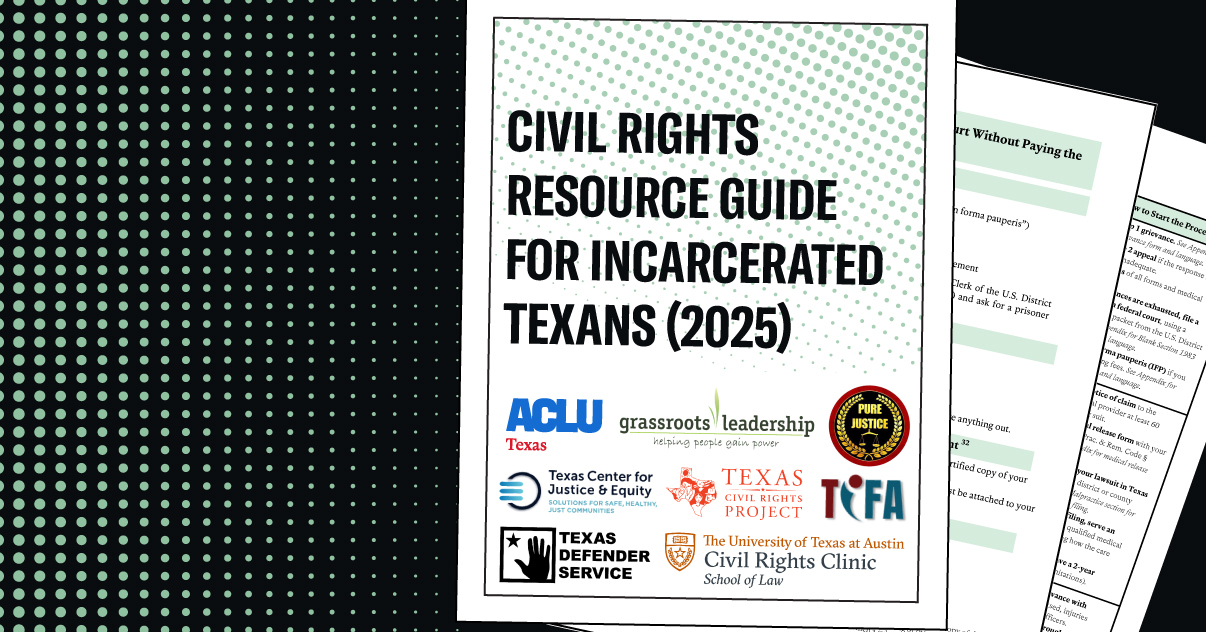Texas prisons are hard places to survive, and even harder to endure when your rights are being violated. Our "Civil Rights Resource Guide" helps ensure people aren’t left powerless — even behind bars.
The Power of Knowing Your Rights
Texas prisons are hard places to survive, and even harder to endure when your rights are being violated. Whether it’s medical neglect, extreme heat, retaliation, or lack of religious accommodations, incarcerated people in Texas face dehumanizing treatment and steep barriers to getting help. Legal assistance is rare. Policies are confusing. Timelines are strict. And most people are left to figure it out on their own.
That’s why the ACLU of Texas created the “Civil Rights Resource Guide for Incarcerated Texans.” This guide is more than a pamphlet — it’s a survival toolkit. Designed for people inside, their families, and advocates, it breaks down your civil rights, how to document abuse, what forms to file, and where to seek outside support.
When someone inside is denied medical care or subjected to unsafe conditions, knowing how to file grievances, request outside intervention, or document what’s happening can make all the difference. This guide helps ensure people aren’t left powerless — even behind bars.
Why This Guide Matters in Texas
Texas incarcerates more people than almost any other state. Its prison system is notorious for overcrowding, deadly heat, inadequate medical care, and lack of oversight. Most people in Texas prisons are Black, Brown, disabled, or from other communities that have historically been denied equal access to legal protection.
Inside, speaking up can be challenging, especially when the system feels stacked against you. The grievance process is one of the few formal tools available to advocate for oneself — but it’s technical and time-sensitive, which makes it even more important to have clear, accessible guidance. This guide is meant to help people navigate that process with confidence and support.
Family members often want to help, but don’t know how. This guide responds to that reality. It offers clear, accessible steps that anyone can use — inside or out — to advocate for dignity and protection in a system designed to keep people silent.
Know the Limits — and Your Power
Filing a lawsuit from prison is hard. The Prison Litigation Reform Act (PLRA) imposes strict rules that can block legal claims if you don’t complete every step of the grievance process on time.
But this guide explains how to protect your rights at each stage. Even without a lawyer, incarcerated people have successfully:
- Accessed necessary medical care
- Challenged retaliation and harmful conditions
- Requested religious accommodations, education, and outdoor time
What’s Inside the Guide
The guide is organized by topic so readers can quickly find what they need. Each section explains:
- What the law says.
- What rights are protected
- What forms to file (with examples)
- Who to contact inside and outside the Texas Department of Criminal Justice (TDCJ)
- What documentation to keep in case of retaliation or legal action
Topics include:
- Medical neglect and access to care
- Sexual abuse and harassment
- Religious accommodations and prayer
- Disciplinary sanctions and retaliation
- Extreme heat, mold, flooding, and broken facilities
- Disability rights and program access
- Filing grievances and preserving legal claims under the PLRA
The Appendix includes:
- Sample I-60s, Step 1 and Step 2 grievances
- Logs for keeping a record of symptoms and incidents (e.g., in cases of medical neglect or abuse)
- Templated for legal complaints
- Grievance tracking calendars
- Address lists for ombuds offices and oversight bodies
Three Ways to Use the Guide
1. For People Inside: A Roadmap for Self-Advocacy
- Understand your rights inside prison
- Learn how to file I-60s and grievances correctly
- Use sample letters to request medical care, religious meals, or disability accommodations
- Track your deadlines and documentation to meet legal requirements
2. For Family and Loved Ones: You Can Help
- Call or email the ombudsman or Health Services Division on their behalf
- Help track timelines using the logs and calendars in the appendix
- Send copies of legal forms, addresses, and logs to loved ones
- Advocate by raising outside awareness or contacting state agencies
3. For Community and Legal Advocates: Support Inside-Outside Connections
- Respond to correspondence from incarcerated people with accurate, current legal information
- Share in Know Your Rights trainings, reentry workshops, or prison newsletters
- Include in visitation packets or mutual aid deliveries
How to Get and Share the Guide
Download the PDF: www.aclutx.org/resourceguide
Request Printed Copies: Email [email protected] or write to:
ACLU of Texas
Attn: Prison Rights Guide
PO Box 8306
Houston, TX 77288
Share this guide with someone inside of include it in your reentry, faith-based, or community programs.
This Guide Is Just One Part of the Work
This guide is a resource — and a reminder that no one loses their rights because they are incarcerated.
The ACLU of Texas will continue to advocate for transparency, oversight, and humane conditions in our prisons. You can be part of the work by sharing this guide, supporting incarcerated Texans, and helping build a more just system for all.
Learn more, take action, or donate at www.aclutx.org


